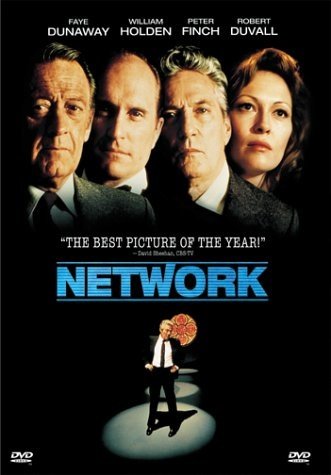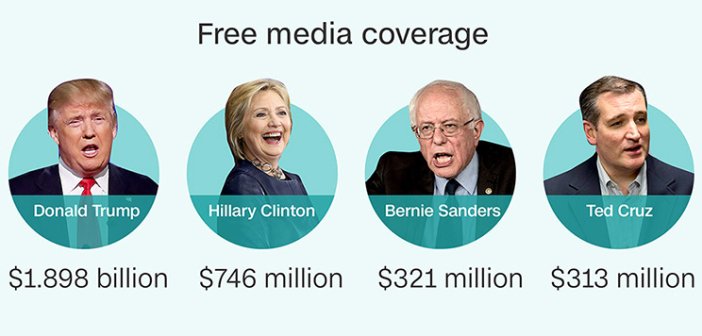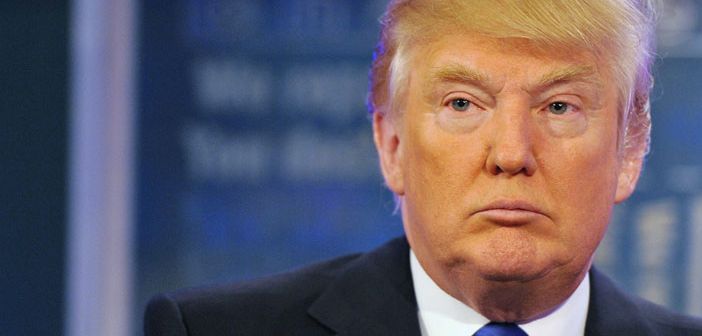40 Years On | How Network Predicted Donald Trump… Kinda
Donald John Trump is going to be President of the United States! Donald John Trump was the Chairman of the Trump Organisation and he is going to be President of the United States! And woe is us! We’re in a lot of trouble!
So, a rich little man with orange hair will be President. What does that got to do with the price of rice, right? And why is that woe to us? Why did I reference a lesser-known speech from 1976’s Network instead of the “I’m as mad as hell” speech? Because “mad as hell” is what got America into this and “woe is us” is what they now face.
The media landscape that enabled the election of a political amateur who boasted about tax-dodging and pussy-grabbing (hence his writing off) has its beginnings in the era depicted by Network. Looking back on the 40th anniversary of its release, we can see how, while at no point does it predict “Hey, if media becomes more sensationalised and commercialised, a trashy celebrity will sweep to power on a neo-fascist platform so be careful”, it does depict the fault lines emerging that led to the media environment Trump could exploit.

Network is about news anchor Howard Beale (Peter Finch), a lonely childless widower approaching retirement with falling ratings. Howard announces that he is going to kill himself during a broadcast and no-one on the disinterested technical team even notices. It takes them a moment to realise what’s happened and at that point there is already a firestorm of controversy. Howard is given one last farewell broadcast before resigning, which he uses for a vulgar rant about how he “ran out of bullshit”. This generates newspaper headlines that impress living ballbusting-careerwoman-as-heartless trope Diana Christensen (Faye Dunaway). She has broken the glass ceiling of leading the programming division at Howard’s network UBS. For Diana, Howard Beale would make truly compelling television; a man sitting in the news anchor chair but who’ll “tell it like it is” and speak directly to the malaise of living in a world with so many problems.
Diana puts Howard back on the air but to the seeming detriment of his mental state. He starts having sweeping mood swings and claiming to have achieved some kind of spiritual enlightenment. Meanwhile in a move towards commercialisation, the UBS news division is reorganised from being a loss-leader (one prepared to cost more than it makes back, as long as it informs the public) to another profit-driven branch of programming. These are the early days of neo-liberalism, when broadcast journalism was one of many areas ripe for commercial opportunities, once the fussy idealists could be worked around. This philosophy of deregulation informs Diana’s no-holds-barred mindset. She allows Howard to say whatever he wants on live television.
[arve url=”https://www.youtube.com/watch?v=ZwMVMbmQBug”]
The blistering energy of the “mad as hell” speech makes it an iconic scene. In terms of content, the speech is a Barnum statement of political angst so generalised that it’s been co-opted across the political spectrum, from anti-capitalist left-wingers to anti-elitist right-wingers, from MSNBC pundits to 9/11 conspiracy documentaries. When the same words can be such a political Rorschach test, is it that good a speech? Or is it precisely because it’s so open to interpretation that it has endured?
The speech climaxes with Howard’s appeal to the viewers that they open their windows and in an act of solidarity shout, “I’m as Mad as Hell! And I’m not going to take it anymore!” It’s notably not “*we’re* mad as hell and *we’re* not going to take it anymore” but a more individualist act of collective action, paradoxically. Nevertheless, reports flood in of people shouting all over the country. The national shouting is a sensation for the time and predicts the dynamic of social media. Yet the physical act of shouting and the overwhelming sound it produces feels so much more powerful than pixels on a screen. It’s the hit Diana was waiting for so she scraps the news anchor set and launches a new show headlined by Howard. Diana says that,
“Howard Beale obviously fills a void. The audience out there obviously wants a prophet, even a manufactured one, even one as mad as Moses!”
Is any of this sounding familiar?
Expressing popular rage brings in ratings. Outrageous characters, with extreme political views, generate interest. Discussion fuels further engagement. Personalities get more focus than policies. In the context of modern media, the US media framed the Presidential election not in terms of policy consequences but in terms of some hyper-real soap opera where the first female President vanquishes the caricature of obnoxious chauvinism. Now there’s a twist ending, we don’t really know what Trump will do… Better keep watching the news for a few more “seasons”.

This is all because conflict is the essence of drama and further entrenching two sides of a deeply polarised political system is a way to get people up in arms, click on your story about the latest kerfuffle and “have our say” on social media. Our outrage, even when based on our deepest moral convictions, is not only contained; it’s harnessed for profit. Money is the be-all and end-all here and it’s the only thing that spells trouble for the content Howard wants to say on his new show. One of his rants crosses the line into hurting the economic interests of UBS’ parent corporation CCA and now he must be reined in.
What could Howard have said? He starts warning the audience that a Saudi Arabian conglomerate wants to merge with CCA and he doesn’t want the power of television to get into the wrong hands. He puts forward the accusation that wealthy Arabs “already own half of England” and hold pervasive influence over economic affairs. Even counter-culture poet Gil Scott-Heron regurgitated it this way, “The Arabs used to be in the Third World; they have bought the Second World and have put a firm down-payment on the First one”.
This trope is quite similar to anti-Semitic conspiracy theories about how Jews are secretly controlling the world’s economy. In Reel Bad Arabs, Jack Shaheen argues that a similar accusation has been levelled at Arabs and is so much more socially-acceptable than anti-Semitism that it can be peddled in a critically-acclaimed movie like Network (not that persecution is a competition). Howard Beale presents captivated audiences with a partial scapegoat in “the Arabs”. It feels like watching the recent rise of eccentric personalities on the far-right conflating the breakdown of economic security with malevolent foreign influences, be it unscrupulous immigrants, unaccountable oligarchs or international authorities.
Howard urges the public to telegram the White House, demanding that the President stop the merger from happening. When the White House receives a record number of telegrams, they give in to this 1970s equivalent of the hashtag and stop the merger. Howard is brought into a private meeting with the CEO of the corporation Arthur Jensen (Ned Beatty). Jensen explodes into his very own over-the-top rant surpassing the energy of Howard Beale pouring his heart out onstage. Jensen tells him he has “meddled in the primal forces of nature” because he has disrupted the “ebb and flow” of international economics, where “The Arabs have taken billions of dollars out of this country, and now they must put it back”. He outlines how corporations are very much aware of their power and that in the dawning era of globalisation, they are more important than nation-states. He tells Howard:
“There is no America. There is no democracy. There is only IBM, and ITT, and AT&T, and DuPont, Dow, Union Carbide, and Exxon. Those are the nations of the world today. What do you think the Russians talk about in their councils of state, Karl Marx? They get out their linear programming charts, statistical decision theories, minimax solutions, and compute the price-cost probabilities of their transactions and investments, just like we do. We no longer live in a world of nations and ideologies, Mr. Beale. The world is a college of corporations, inexorably determined by the immutable bylaws of business. The world is a business, Mr. Beale.”
[arve url=”https://www.youtube.com/watch?v=zI5hrcwU7Dk”]
It’s not that there’s an Illuminati making all the world’s decisions in one specific boardroom; it’s that the boardrooms of the most powerful corporations will have parameters for an agenda that maintains their power and they’ll do what it takes to increase that power. Jensen convinces Howard in his fragile mental state, to preach this more resigned outlook on life, so that he not only avoids repeating his faux-pas but that he dashes the public’s hopes for a firebrand smashing the system.
Howard Beale obliges and he begins his next episode by saying the stopping of the CCA merger was a great triumph but the last one the American public can hope for. There’s no point in advocating for further social change, he tells them, because the powerful have already succeeded in making people economically insecure. Diana is keen to get this buzzkill show off the air as its ratings have plummeted but Jensen’s insistence the show remain on is described as “intractable and adamantine”. They conclude the only way to get Howard’s show off the air is if Howard dies and that having him be assassinated by terrorists on-air would be one last ratings-boost. They are so removed from the consequences of their actions on human life now that profit is their only consideration.
And thus the movie ends with a man’s life taken. A freeze-frame of Howard’s dead body stays on-screen next to the noise of multiple channels, some reading solemn stories about his death, others moving on to other stories, others playing commercials and so on. A violent public death is just another item of media consumption in a growing marketplace. Everyone has become dehumanised and expendable. That is the darkly absurd world Network predicted. The problem is it didn’t go far enough.

With news media more and more commercialised since the 1970s, they begin reporting on divisive stories that grab attention rather than inform perspectives. The truth, the most reasonable presentation of the best available facts, starts to matter a lot less than what generates conflict. Meanwhile, entertainment media places more money in reality TV programming that draws in audiences to see larger-than-life characters get into overblown conflict. Donald Trump, deeply insecure about the billionaire playboy public image he spent so long cultivating, seeks to cement it further by appearing as the corporate top-dog, deciding which business ideas live and die, in The Apprentice and Celebrity Apprentice.
When Trump announced a Presidential run, reality TV started taking over reality. American network coverage of Presidential elections noted the success of reality TV framing devices, and moved to place more of an emphasis on the personalities and electoral successes of different political figures, rather than policy substance. This is a recipe for a disaster in an increasingly-polarised democracy with a winner-takes-all system, where social media algorithms create echo chambers that monetise outrage, benefiting from heightening people’s anxiety and frustration.
There is a chilling Ouroboros effect with this media environment in that they have facilitated the erratic star of a genre where reality is heightened becoming one of the world’s most powerful people. This heightens our reality in turn, making us all characters in a horrifying TV show we can’t escape. But who knows? In the movies, someone always comes to save America at the last moment. Maybe this is the end of an Act II low-point where all hope seems lost. But it sure doesn’t feel like there’s any way for America to come back from this.
Gil Scott-Heron explored the absurdity of B-movie star Ronald Reagan becoming President with his song B-Movie. It’s a pretty incisive analysis of Reagan’s election that echoes with relevance to recent events. It suggests one way of processing Reagan’s rise to power, “This ain’t really your life, this really ain’t nothing but a movie”.
[arve url=”https://www.youtube.com/watch?v=XBu2Dz9NZMI”]
Featured Image Credit

